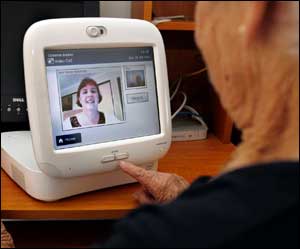Intel remote health enters Aus with pilot

Following the start of a pilot study in NSW's Hunter Valley, Intel has released its remote patient monitoring system, Intel Health Guide, to the Australian market.

Nurse and patient video-conferencing
(Credit: Intel Australia)
The system allows for regular monitoring of vital signs like heart rate, glucose levels or weight changes, sending patients reminders and notifications, as well as enabling communication remotely via video-conferencing. Nurses and doctors can monitor patients remotely and determine when they require consultation or further assistance, reducing the need for regular hospital visits and increasing the number of patients nurses are able to care for.
In the study, 50 high-risk patients from Hunter Nursing Agencies in Toronto, NSW, have been using the system to see if remote care can reduce hospitalisations, improve patient quality of life and prioritise patients for in-person visits by nurses and doctors.
"Through our pilot study, we've found the Intel Health Guide works very well in a community nursing setting by providing our clinicians with increased access to the patient's vital signs and responses, and enablement of video-conferencing communication with our patients in their homes. The patients have found the device incredibly simple to use, and by identifying trends such as changes in body weight at an early stage, patients are engaging in their own care, reducing the need to visit GP practices and improving the patient's health and lifestyle," Margaret Scott OAM, nursing director, Hunter Nursing said in a statement.
The Intel Health Guide
(Credit: Intel Australia)
Australia is the third country to give regulatory approval to the remote care device, after it was accepted for supply in Australia by the Therapeutics Goods Administration of Australia last August. The US and the UK have also approved the technology. Healthe, an international health services provider will be the first local reseller.
As 81 per cent of Australians over 65 years of age currently suffer from chronic health conditions, Intel Australia's health industry manager, Dr George Margelis believes remote patient care will become more vital as the local population ages.
"With more than 4 million Australians expected to be over the age of 70 by 2050, it is vital that we collaborate with clinicians and government on effective and viable technological solutions that enable new models of care," he stated.